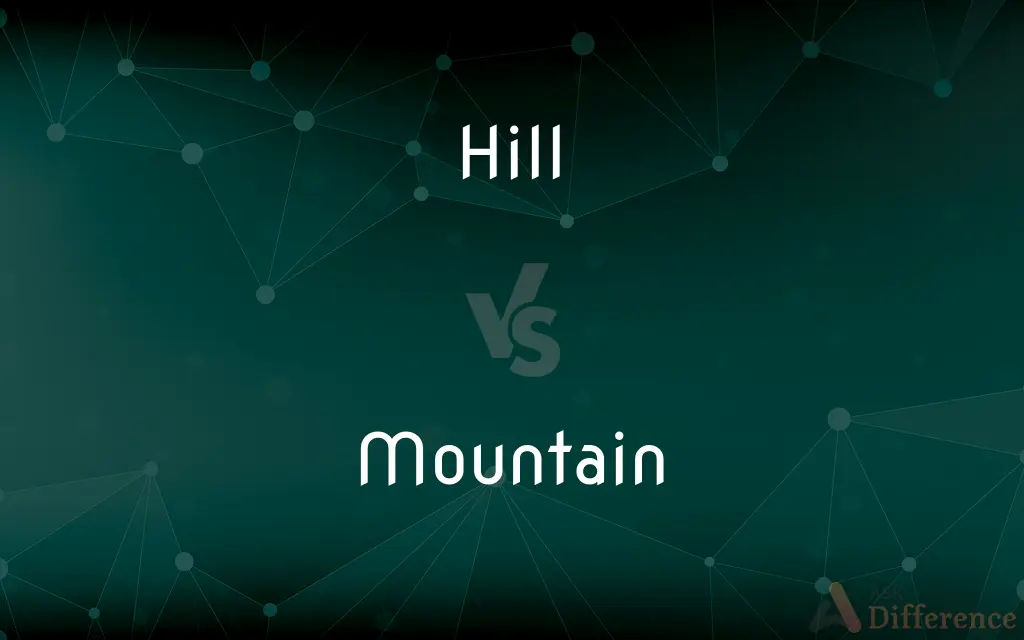Hill vs. Mountain — What's the Difference?
By Tayyaba Rehman & Fiza Rafique — Updated on September 11, 2023
A hill is a raised area of land with a summit less than 2,000 feet, while a mountain is a natural elevation of the earth's surface rising to a summit higher than 2,000 feet.

Difference Between Hill and Mountain
Table of Contents
ADVERTISEMENT
Key Differences
A hill is defined as a raised area of land that has a summit that is generally lower than that of a mountain. In contrast, a mountain is a significantly larger natural elevation with a much higher summit.
Hills are easier to climb than mountains. Mountains often require specialized equipment and skills to ascend, due to their greater height, steeper slopes, and more challenging terrain.
Hills are generally found in less extreme environments, often near plains or rivers. Mountains can be found in ranges and can create their own microclimates, sometimes including snow and extreme weather conditions.
Hills are usually less than 2,000 feet in elevation, whereas mountains exceed this height. In some countries, specific criteria differentiate hills from mountains based on elevation, prominence, and other factors.
Grammatically, both "hill" and "mountain" are nouns and can be pluralized as "hills" and "mountains." They can also serve as metaphors in literature, symbolizing obstacles or goals.
ADVERTISEMENT
Comparison Chart
Height
Less than 2,000 ft
More than 2,000 ft
Terrain
Easier
Challenging
Location
Near plains, rivers
In ranges
Climbing
Easier
Difficult
Plural Form
Hills
Mountains
Compare with Definitions
Hill
Hill is a small elevation of land.
The children enjoyed rolling down the hill.
Mountain
Mountain is a large elevation of land.
Climbing the mountain was a real challenge.
Hill
Hill has a height usually less than 2,000 feet.
The hill is an ideal spot for beginner hikers.
Mountain
Mountain exceeds 2,000 feet in height.
The mountain towered over the village.
Hill
Hill can be easily climbed.
We decided to walk up the hill for exercise.
Mountain
Mountain may require special equipment to climb.
You need proper gear to climb this mountain.
Hill
Hill is often found near plains or rivers.
The hill offers a panoramic view of the river.
Mountain
Mountain can create its own microclimate.
The weather is colder at the mountain's summit.
Hill
Hill can be pluralized as "hills."
The region is known for its rolling hills.
Mountain
Mountain can be pluralized as "mountains."
The country is famous for its rugged mountains.
Hill
A hill is a landform that extends above the surrounding terrain. It often has a distinct summit.
Mountain
A mountain is an elevated portion of the Earth's crust, generally with steep sides that show significant exposed bedrock. A mountain differs from a plateau in having a limited summit area, and is larger than a hill, typically rising at least 300 metres (1000 feet) above the surrounding land.
Hill
A well-defined natural elevation smaller than a mountain.
Mountain
Abbr. Mt. or Mtn. A natural elevation of the earth's surface having considerable mass, generally steep sides, and a height greater than that of a hill.
Hill
A small heap, pile, or mound.
Mountain
A large heap
A mountain of laundry.
Hill
A mound of earth piled around and over a plant.
Mountain
A huge quantity
A mountain of trouble.
Hill
A plant thus covered.
Mountain
(countable) An elevation of land of considerable dimensions rising more or less abruptly, forming a conspicuous figure in the landscape, usually having a small extent of surface at its summit.
Everest is the highest mountain in the world.
We spent the weekend hiking in the mountains.
Hill
An incline, especially of a road; a slope.
Mountain
(countable) Something very large in size or quantity; a huge amount; a great heap.
He was a real mountain of a man, standing seven feet tall.
There's still a mountain of work to do.
Hill
Capitol Hill. Often used with the.
Mountain
(figuratively) A difficult task or challenge.
Hill
The US Congress. Often used with the.
Mountain
Wine from Malaga made from grapes that grow on a mountain.
Hill
To form into a hill, pile, or heap.
Mountain
A woman's large breast.
Hill
To cover (a plant) with a mound of soil.
Mountain
(cartomancy) The twenty-first Lenormand card.
Hill
An elevated landmass smaller than a mountain.
The park is sheltered from the wind by a hill to the east.
Mountain
A large mass of earth and rock, rising above the common level of the earth or adjacent land; earth and rock forming an isolated peak or a ridge; an eminence higher than a hill; a mount.
Hill
A sloping road.
You need to pick up speed to get up the hill that's coming up.
Mountain
A range, chain, or group of such elevations; as, the White Mountains.
Hill
(US) A heap of earth surrounding a plant.
Mountain
A mountainlike mass; something of great bulk; a large quantity.
I should have been a mountain of mummy.
Hill
(US) A single cluster or group of plants growing close together, and having the earth heaped up about them.
A hill of corn or potatoes
Mountain
Of or pertaining to a mountain or mountains; growing or living on a mountain; found on or peculiar to mountains; among mountains; as, a mountain torrent; mountain pines; mountain goats; mountain air; mountain howitzer.
Hill
(baseball) The pitcher’s mound.
Mountain
Like a mountain; mountainous; vast; very great.
The high, the mountain majesty of worth.
Hill
The raised portion of the surface of a vinyl record.
Mountain
A land mass that projects well above its surroundings; higher than a hill
Hill
To form into a heap or mound.
Mountain
A large number or amount;
Made lots of new friends
She amassed a mountain of newspapers
Hill
To heap or draw earth around plants.
Mountain
Relating to or located in mountains;
Mountain people
Hill
A natural elevation of land, or a mass of earth rising above the common level of the surrounding land; an eminence less than a mountain.
Every mountain and hill shall be made low.
Hill
A single cluster or group of plants growing close together, and having the earth heaped up about them; as, a hill of corn or potatoes.
Hill
To surround with earth; to heap or draw earth around or upon; as, to hill corn.
Showing them how to plant and hill it.
Hill
A local and well-defined elevation of the land
Hill
Structure consisting of an artificial heap or bank usually of earth or stones;
They built small mounds to hide behind
Hill
United States railroad tycoon (1838-1916)
Hill
Risque English comedian (1925-1992)
Hill
(baseball) the slight elevation on which the pitcher stands
Hill
Form into a hill
Common Curiosities
What is a Hill?
A hill is a small, raised area of land usually less than 2,000 feet high.
How high is a Hill typically?
Usually less than 2,000 feet.
Is a Hill easy to climb?
Generally, yes, hills are easier to climb.
What is the plural of Hill?
Hills.
Is a Mountain easy to climb?
Generally, no, mountains require special skills and equipment.
What is a Mountain?
A mountain is a large, natural elevation usually more than 2,000 feet high.
How high is a Mountain typically?
Usually more than 2,000 feet.
Where are Mountains usually located?
Often in ranges, sometimes creating their own microclimates.
Is Mountain a proper noun?
No, unless it's part of a specific name like "Mount Everest."
How are Hill and Mountain similar?
Both are elevated landforms.
What is the plural of Mountain?
Mountains.
How are Hill and Mountain different?
Primarily in terms of height, difficulty to climb, and their locations.
Where are Hills usually located?
Often near plains, rivers, or coasts.
Is Hill a proper noun?
No, unless it's part of a specific name like "Capitol Hill."
Can Hill and Mountain be used metaphorically?
Yes, both can symbolize challenges or objectives.
Share Your Discovery

Previous Comparison
So vs. Soo
Next Comparison
Nanna vs. NanaAuthor Spotlight
Written by
Tayyaba RehmanTayyaba Rehman is a distinguished writer, currently serving as a primary contributor to askdifference.com. As a researcher in semantics and etymology, Tayyaba's passion for the complexity of languages and their distinctions has found a perfect home on the platform. Tayyaba delves into the intricacies of language, distinguishing between commonly confused words and phrases, thereby providing clarity for readers worldwide.
Co-written by
Fiza RafiqueFiza Rafique is a skilled content writer at AskDifference.com, where she meticulously refines and enhances written pieces. Drawing from her vast editorial expertise, Fiza ensures clarity, accuracy, and precision in every article. Passionate about language, she continually seeks to elevate the quality of content for readers worldwide.














































